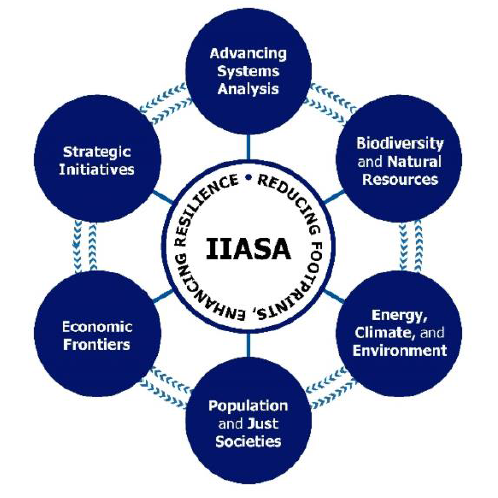Supporting global sustainability goals
IIASA’s research plan 2021-24 aims to spotlight opportunities for simultaneously achieving multiple global sustainability goals while minimizing trade-offs; using multidisciplinary, collaborative and inclusive approaches that better integrate behaviour, equity, justice and resilience imperatives.
Unsustainable consumption, social inequalities, climate change, pollution, and biodiversity loss are deeply intertwined problems, demanding a systemic approach to finding solutions. Our research plan for 2021 to 2024 will harness and apply IIASA’s strengths in systems analysis to provide the world with the analytical underpinnings to achieving its sustainability goals—both within the desired time frames and ensuring equitable and just outcomes.
The re-designed research structure will enhance the integration of scientific work across the institute and so strengthen IIASA as it navigates the global system of systems. For example, IIASA will develop its agility to flexibly link models to identify new connections and feedbacks across the boundaries of systems previously considered in isolation. This can help to reveal policy options that harvest multiple dividends and co-benefits.
Open access to data and models enables the flexible linking and re-linking of models and will also spur collaboration beyond IIASA. For example, the Energy, Climate and Environment Program has been opening up its modelling framework to create an international user community of scientists and decision-makers, who can co-design research with IIASA.
Much of the plan is about engine alignment: making sure that existing IIASA expertise is fully engaged with global issues, capturing the full complexity and heterogeneity of the challenges we face, and increasing the co-design of research with stakeholders. The Strategic Initiatives Program explicitly aims to boost research that combines expertise across the Institute’s research programs and addresses priority areas of multiple National Member Organizations.
Some components of the research approach are being heavily upgraded. To bolster IIASA’s analytical toolkit, the Advancing Systems Analysis Program will develop new systems tools including those that involve data science, machine learning, agent-based modelling, and decision support. It will also fill data gaps such as those related to monitoring the Sustainable Development Goals by improved earth observation technologies, citizen science, and novel data sources.
The Biodiversity and Natural Resources Program will give us much more power to explore the natural world. Its integrated biosphere model will encompass forest, farms, rivers, coasts, and biodiversity; and combine with existing IIASA expertise to untangle the nexus of food production, land and ecology conservation, water security, climate and disease.
The expanded Population and Just Societies Program will focus on equity, justice, and human wellbeing. The research activities take an inclusive, participatory approach, engaging with stakeholders to understand differing values around the world in an attempt to codesign what a just and equitable society should be while considering the health of the planet.
Insights on population dynamics and heterogeneities along with others from across all programs will help to inform the new Economic Frontiers Program, investigating how to shift economic activity to more just, resilient and sustainable patterns and what changes to institutions and policies need to be undertaken to secure such changes.
Altogether, the research plan aims to help IIASA inform policy with the best science: enabling decision-makers to balance human needs and with those of nature, and build sustainable, resilient societies. The goal will be supported by further strengthening its collaboration with the broader scientific community, adopting transdisciplinary approaches, and enhancing system analysis capacities where needed.
